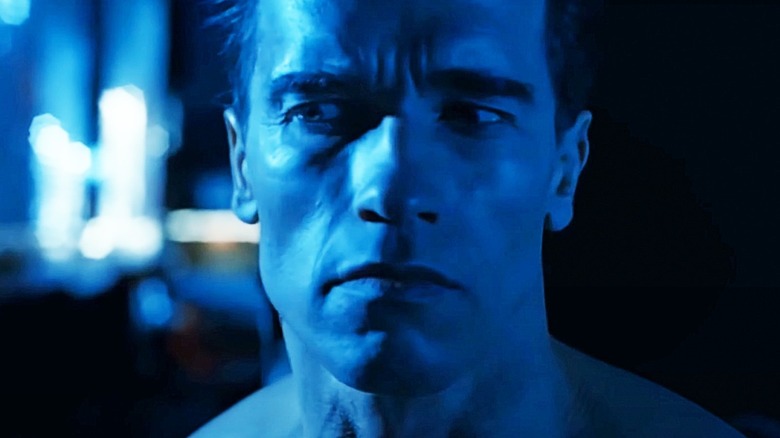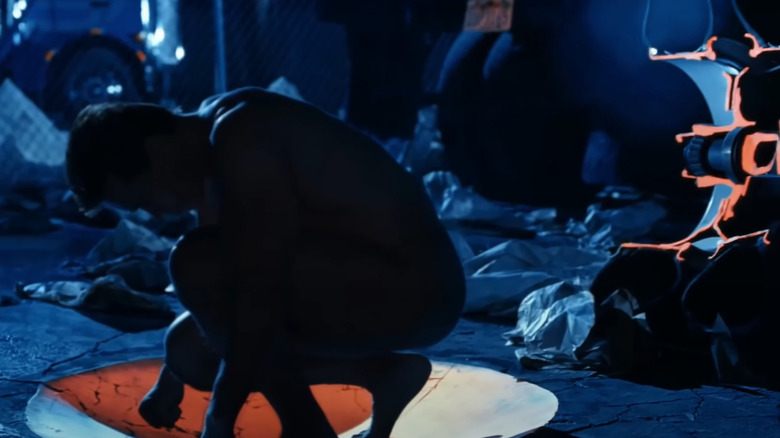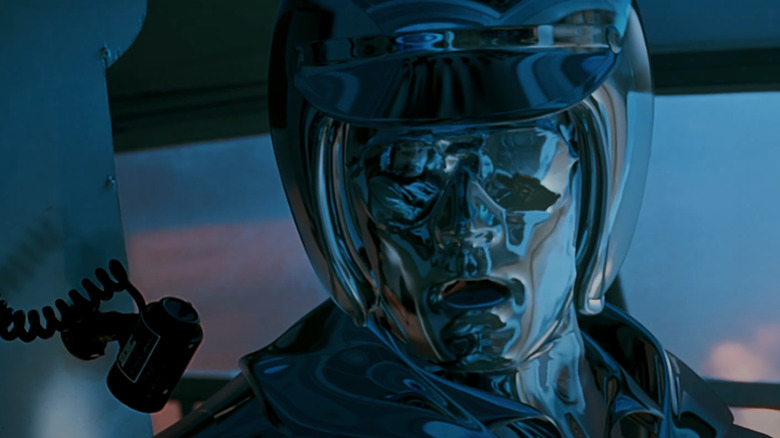How James Cameron Went $20 Million Over Budget On Terminator 2 And Got Away With It
Giving James Cameron a ridiculous amount of money to make a film is standard practice these days. The director loves spending studio money, but he also has a knack for making it back and then some. That's allowed him to craft a directorial career which has seen each of his films increase in budget like clockwork. Since the meager $6.4 million dollars it took to make "The Terminator" in 1984, Cameron has steadily increased his financing with every subsequent film. 1986's "Aliens" clocked in at $17 million before things escalated significantly with 1989's "The Abyss," which cost a cool $70 million to make.
So when it came time for Cameron to make a sequel to "The Terminator," independent production company Carolco was willing to up the ante once again. "Terminator 2: Judgment Day" secured its place in cinematic history for multiple reasons: Its groundbreaking visual effects, affecting story, grand action set-pieces, and outstanding performances combine to make it not just one of the greatest sequels in film history, but one of the finest movies ever made. Unsurprisingly, though, such things don't come cheap.
Carolco was betting big on Cameron, which at the time was a much greater risk than it would be today. The director had proven he could make a decent sequel with "Aliens," but "The Abyss," his last film prior to "Terminator 2," hadn't done well at the box office at all, making just $54 million globally. When green-lighting "T2" Carolco had no "Titanic" or "Avatar" to base its financial decisions on. But somehow, just as he always does, Cameron managed to not only get a record budget out of the company, but also push that budget to a point that had everyone concerned. How? Allow me to explain.
The ever-escalating cost of Terminator 2
To this day, nobody is actually sure exactly how much "Terminator 2" cost. In 1991 when the film debuted, the estimates ranged from $70 million right up to $100 million — which at the time would have been the biggest movie budget in history. Elsewhere, there were claims the final figure was around $90 million, but neither Cameron nor Carolco would confirm. One thing was certain. however: as the production went on, the budget went up and up.
In 2022, Cameron claimed the movie was greenlit with an $80 million budget and things increased from there:
"[$80 million] is what Carolco greenlit with a big gulp. And then as production went on it crept up. And as it was kind of approaching $100 million they were blanching, they thought they were screwed [...] it certainly felt like gloom and doom at the time."
What was costing so much? Well, The New York Times reported that "T2" had the "largest stunt budget ever" with Carolco allocating $1 million to stunts equating to an incredible 800 days of stunt work. Then there were those now-famous CGI liquid metal effects. According to Carolco co-founder Mario Kassar, those shots alone cost $17 million. Speaking to Deadline, the former head of the production company also revealed that before shooting even began, he had to spend around $17 million on acquiring the Terminator rights.
Perhaps the most absurd expense was Arnold Schwarzenegger's private jet — which, according to Kassar, was somewhat of a marketing gimmick: "A big star like Arnold would get paid his huge fee weekly guaranteed, but with a plane we could pay it off over many years and amortize the cost, so it actually worked out for us financially and also was a major marketing coup."
Cameron almost terminated Carolco ... or did he?
It's no surprise that there was talk of "T2" bankrupting Carolco. The independent company had seen great success making blockbuster movies in the independent space, in part due to its US distribution deal with TriStar. But James Cameron's ever escalating budget was looking like it could be the nail in the coffin. As Kassar said: "It was all over the news. The movie that was going to bankrupt Carolco. The most expensive independent movie of all time. Everyone from Larry King to CNN; everyone was destroying the whole thing."
According to the Deadline article, the final budget ended up around $102 million, which Kassar didn't outright refute in his answers. Still, there hasn't been any official confirmation on the final figure. And in a sense it doesn't matter, because "Terminator 2" proved to be a huge hit which recouped it massive budget with relative ease, raking in $515 million at the global box office and becoming a pop culture sensation. Had it not, that could very well have been the end for Carolco.
But despite Cameron's contention that the production company was "blanching" as the budget ballooned, Kassar told Deadline that he actually wasn't too worried:
"If you run numbers through the computer you never make a movie in your life, because you never make any money unless the film is a f****** 'Jurassic Park.' So I would only run the numbers for foreign; I knew what I was getting for the US through the TriStar deal, I had my video company giving me another output. I was sometimes at 110% above the budget before I started shooting, so I had no problem with the numbers."
The trend continues
After "T2" became a massive hit, Cameron would be granted an actual budget of $100 million for his next movie, "True Lies" which also included a ridiculous amount of stunts and a budget that was pushed to its limits. At the time, $100 million was a record, but it seems plausible that record might, in reality, belong to "Terminator 2." Either way, Cameron would continue his trend with "Titanic" in 1995 which came in at $200 million, and "Avatar" which cost $237 million.
Now, with "Avatar: The Way of Water" finally out in the world, Cameron has made what might be his most expensive movie yet. But just like back in 1991, nobody actually knows how much he spent this time around. According to the director, the movie was "very f****** expensive" and "the worst business case in movie history."
Frankly, at this point we expect nothing less. If Cameron can repeat his sequel success with the "Avatar" follow-up, he'll cement his status as the king of the sequel and prove once again that giving him a lot of money isn't as big a risk as it might seem. Although this time, he's said the movie has to become the "third or fourth highest-grossing film in history" to break even, which would mean it has to make at least around $2 billion for 20th Century Studios to recoup their money. That seems like an insane figure, but if Cameron's proved anything it's that he can not only stretch a budget to its absolute breaking point, but that he can make it all right back.
It's worth noting that Carolco actually did end up going bankrupt a few years later, and the company's willingness to throw big money around was definitely a factor. But it left behind a legacy that includes not only "T2" but also "Total Recall," "Basic Instinct," "Jacob's Ladder," and the first three "Rambo" movies. Now that's money well-spent.



